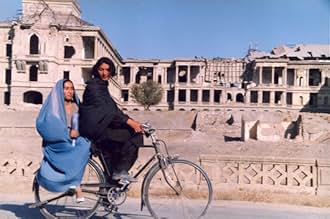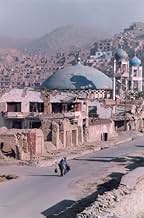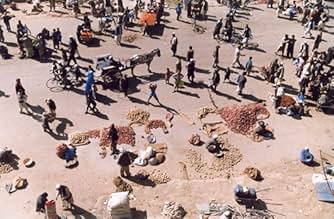IMDb RATING
6.8/10
1.6K
YOUR RATING
In a post-Taliban Afghanistan a young woman (Agheleh Rezaie) attends school against her conservative father's will, hoping to learn more about democracy to fulfill her dream of being the cou... Read allIn a post-Taliban Afghanistan a young woman (Agheleh Rezaie) attends school against her conservative father's will, hoping to learn more about democracy to fulfill her dream of being the country's next president.In a post-Taliban Afghanistan a young woman (Agheleh Rezaie) attends school against her conservative father's will, hoping to learn more about democracy to fulfill her dream of being the country's next president.
- Director
- Writers
- Stars
- Awards
- 4 wins & 2 nominations total
- Director
- Writers
- All cast & crew
- Production, box office & more at IMDbPro
Featured reviews
In "At Five in the Afternoon", we follow the fortunes of a young woman in Afghanistan and her family. Nogreh is caught between two worlds. On the one hand, she attends a school where the teacher encourages girls to become doctors, engineers and even President. At the same time, Nogreh must wait until she steps out of her father's home before she lifts the veil of her burka and trades flat-soled shoes for high heels.
Nogreh is a very idealistic and ambitious young woman who emulates Benazir Bhutto of Pakistan and dreams of being President of her own country some day. Yet she has been kept in a state of childlike naivety and ignorance about politics at home and abroad, due to the teachings of the Koran, Shariah (Islamic law) and the Taliban.
It is exciting to hear the young girls debate the status of women in their country. But the film is also sympathetic and understanding toward the old Afghanistan, symbolized by Nogreh's father. He bewails that "Blasphemy has overrun the city" and the world, as he knew it, has ceased to exist. To add pathos to the situation, he feels he can confide his feelings only to a dumb animal -- his donkey, who "knows nothing but hay".
The film's title echoes a recurring verse from Federico Garcia Lorca's poem, "Lament for Ignacio Sanchez Mejia", about the goring of a bullfighter. Like Lorca's poem, "At Five in the Afternoon" is clouded over by a somber atmosphere of tragedy, death and despair. Yet the film remains remarkable for its astonishingly hopeful -- and indeed radical and revolutionary -- vision of hope for Afghanistan and indeed all of the Arab world.
Nogreh is a very idealistic and ambitious young woman who emulates Benazir Bhutto of Pakistan and dreams of being President of her own country some day. Yet she has been kept in a state of childlike naivety and ignorance about politics at home and abroad, due to the teachings of the Koran, Shariah (Islamic law) and the Taliban.
It is exciting to hear the young girls debate the status of women in their country. But the film is also sympathetic and understanding toward the old Afghanistan, symbolized by Nogreh's father. He bewails that "Blasphemy has overrun the city" and the world, as he knew it, has ceased to exist. To add pathos to the situation, he feels he can confide his feelings only to a dumb animal -- his donkey, who "knows nothing but hay".
The film's title echoes a recurring verse from Federico Garcia Lorca's poem, "Lament for Ignacio Sanchez Mejia", about the goring of a bullfighter. Like Lorca's poem, "At Five in the Afternoon" is clouded over by a somber atmosphere of tragedy, death and despair. Yet the film remains remarkable for its astonishingly hopeful -- and indeed radical and revolutionary -- vision of hope for Afghanistan and indeed all of the Arab world.
In a devastated Afghanistan post-Taliban, Nogreh is a woman that goes to a school without the knowledge of her conservative father that sees blasphemy everywhere. She dreams on becoming President of Afghanistan, but wears burqa and fears her father; she is interested to know whether there are other women presidents further to the Pakistani prime-minister Benazir Bhutto; and she wants to know their speeches to be elected president. Nogreh wanders with her father and her sister-in-law Leylomah with her baby in a buggy with their old horse. Leylomah is seeking-out her missing husband Akhtar and has problem to feed her baby due to her own starvation. Along their travel for survival, they see their country devastated by war and misery.
"Panj É Asr" is a very sad tour though Afghanistan, a country devastated by the civil war, the successive invasions and war against Russians and Americans and the Taliban regime since the 70's. It is impressive to see only ruins of former cities and palaces, and the poor and illiterate people dying without food or water. The ignorance of the common people and the treatment to the women are also amazing. This movie is a sort of documentary and despite the lack of resources and the flawed screenplay, the director Samira Makhmalbaf has the merit of exposing these wounds to the world. My vote is six.
Title (Brazil): "Às Cinco da Tarde" ("At Five in the Afternoon")
"Panj É Asr" is a very sad tour though Afghanistan, a country devastated by the civil war, the successive invasions and war against Russians and Americans and the Taliban regime since the 70's. It is impressive to see only ruins of former cities and palaces, and the poor and illiterate people dying without food or water. The ignorance of the common people and the treatment to the women are also amazing. This movie is a sort of documentary and despite the lack of resources and the flawed screenplay, the director Samira Makhmalbaf has the merit of exposing these wounds to the world. My vote is six.
Title (Brazil): "Às Cinco da Tarde" ("At Five in the Afternoon")
10WCS02
This movie tugged at my heartstrings delivering an unforgettable portrayal of Afghan life. It's a 10 out of 10, poetically revealing modern life in a city relegated to Neanderthal living conditions after the Taliban was sent packing.
The Film's title is the title of an extraordinarily relevant poem, recited twice during the film.
Though a tough way to learn Farsi (it's subtitled - phew!) "At Five in the Afternoon" awakened me to the plight of the poor souls coping with the rubble and 19th century technology.
The film describes (teenaged) Noqreh's life as she attends school and struggles to discover her role in society now that "any" job is within her reach. She decides to become the country's President.
The zesalots may be gone ... but there's plenty of cranky, old, conservative men (her father among them) who long for the "good ole'days". The country's problems (among them: live buried mines, religious extremism, the absence of basic social commodities - water / education - after several wars) serve as the antagonist as Noqreh's father carts her and her extended family across the Afghan dustbowl in search of her brother, The film moves slowly and deliberately, but I guarantee you'll be paid for your time investment with a once in a lifetime education about Afghanistan.
I hope you find a copy or a showing, and allocate the 2 hours to let it wash over you and take hold.
The Film's title is the title of an extraordinarily relevant poem, recited twice during the film.
Though a tough way to learn Farsi (it's subtitled - phew!) "At Five in the Afternoon" awakened me to the plight of the poor souls coping with the rubble and 19th century technology.
The film describes (teenaged) Noqreh's life as she attends school and struggles to discover her role in society now that "any" job is within her reach. She decides to become the country's President.
The zesalots may be gone ... but there's plenty of cranky, old, conservative men (her father among them) who long for the "good ole'days". The country's problems (among them: live buried mines, religious extremism, the absence of basic social commodities - water / education - after several wars) serve as the antagonist as Noqreh's father carts her and her extended family across the Afghan dustbowl in search of her brother, The film moves slowly and deliberately, but I guarantee you'll be paid for your time investment with a once in a lifetime education about Afghanistan.
I hope you find a copy or a showing, and allocate the 2 hours to let it wash over you and take hold.
I loved the characters of the movie - the people were really *there* you could see them. Even though I did not understand the language and the subtitles were in French (which, since I am not very proficient in French, I had trouble reading sufficiently fast), I did appreciate the emotions conveyed by the protagonists. This movie might be a bit slow for some people - however I found the timing just right. A minor gripe is the sound - the recording is not particularly good and a lot of scenes are completely silent, apart from the audible tape hiss. The result is a a minor loss in atmosphere (The crackling of the fire, the sputtering of the lamp, the shifting under the blanket, the shallow sleeping breath, all could have added a lot to the silent scenes, if they were added at the barely-audible level).
Apart from that, it is very good. Check it out.
Apart from that, it is very good. Check it out.
This movie will be very moving, if you can sit still and take the opportunity to be drawn into the disturbing situation of a destroyed Kabul after 25 years of war. The story of Noqreh who dreams of becoming president while hiding her school attendance from her conservative father is very intense. Togehter with the sister-in-law and her sick child, Noqreh and her father are looking for a place to live in the ruins, they briefly stay in a crashed airplane and the bombed parliament building, before leaving the city for a more traditional country side... The camera observes, taking its time to capture the essence of the moments and the characters, including a staged debate between the two presidential candidates in the girl school. While the women start discovering some freedom (sun-umbrellas; dressing shoes), the men are struggling with keeping their faith in the new realities and everybody -including truck loads of returning refugees from Pakistan - is only trying to survive. At the moment, when a few helicopters flying over the head of the traveling family and they look up, I realized how deeply drawn I was into the movie and its very sad reality - so out of place seemed this modern technological machine compared to the mule-drawn carriage in a harsh landscape. Highly recommended, if you like Rohmer, Tarkowski or Mambety - 9 out of 10 stars!
Did you know
- TriviaSamira Makhmalbaf had difficulty casting the lead role of Nogreh because many women refused to appear on camera without their burqa. Agheleh Rezaie was her second choice after the initial woman she cast dropped out after Makhmalbaf said she would have to show her face to the camera.
- ConnectionsFeatured in Joy of Madness (2003)
Details
- Release date
- Countries of origin
- Language
- Also known as
- At 5 in the Afternoon
- Filming locations
- Production companies
- See more company credits at IMDbPro
Box office
- Gross worldwide
- $515,144
Contribute to this page
Suggest an edit or add missing content





















